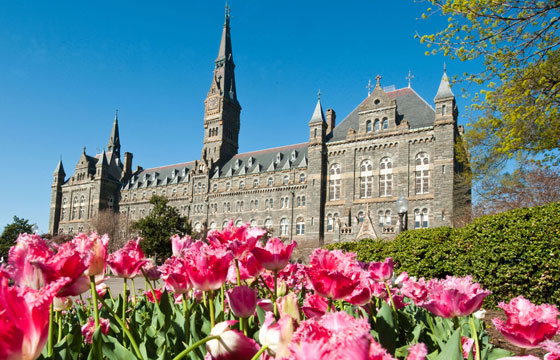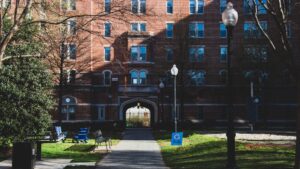Congratulations, Hoyas. You’ve made it through another grueling academic year, and the end to all the hard work you’ve put in these last two semesters is definitely cause for celebration. Today, the last Friday of classes, is Georgetown Day, a day to celebrate and relax as the term ends and finals approach. We at the Voice wish the Georgetown community a happy Georgetown Day, and hope that you all stay safe and have fun.
However, because of the administration’s desire to limit the festivities on campus, 2017 marks a crossroads for the annual year-end celebration. This editorial board believes that students deserve a day to unwind in between a long semester and upcoming finals, and that Georgetown Day fills this role. We also believe that, in order to make the holiday more safe and inclusive for the entire student body, the university should recognize and support the holiday, rather than take action to stifle student activities.
This year the university will be tracking metrics relating to Georgetown Day, according to GUSA’s weekly newsletter. The newsletter states that they will be collecting data on the number of SNAPS, GERMS, and GUPD calls. GUSA has included these details to inform students of the university’s intentions and to encourage students to have a safe Georgetown Day. They have even initiated a “Save Georgetown Day” Facebook event for April 4 to stress to students the importance of acting responsibly to keep the tradition alive.
While there is no doubt that students sometimes go too far in their celebrations, the strategy of tracking metrics has the potential to come across as a scare tactic. Collecting statistics is easily perceived as a guise for threatening to shut down Georgetown Day. Such tactics have the capability of bringing about the very real danger of decreasing student motivation to use GERMS. Students should not be afraid to call GERMS because they think it will lead to punishment for them or the student body as a whole. GERMS specifically has a medical amnesty policy to protect students from such repercussions.
The university’s initiative to begin counting these calls on Georgetown Day comes on a year that the event is not funded at all by GUSA. Because the Georgetown Day Planning Committee failed to submit a funding request for this year, GUSA Finance and Appropriations Committee (Fin/App) did not allocate them funding. The Hoya reported that a divide in opinion on the importance of increasing the funding for Georgetown Day between the freshmen and upperclassmen members of Fin/App also contributed to the failure to allocate funds.
Rather than shy away from Georgetown Day as a whole, the university administration and GUSA should instead shift their focus towards instituting more activities for the student body on campus. By shutting down institutional support for the holiday, the university will push students to take their celebrations off campus, further harming relations with neighbors and putting students at risk.
Cutting on-campus opportunities on Georgetown Day will likely serve to increase tensions with neighborhood residents, who were particularly distraught after Homecoming festivities this past fall. Many residents complained to the school about public drunkenness, trash, and general disruptions. A Georgetown Day not institutionally recognized by the university will only exacerbate these frustrations.
Providing programs and activities on campus that do not revolve around drinking has many benefits. The implementation of more games, concerts, and food trucks gives students a chance to celebrate together, in an environment where students who choose not to drink can also relax and celebrate their accomplishments throughout the year. These types of events will help cultivate a greater aura of inclusivity around the event as a whole.
Georgetown Day can and should be a day to have fun. We call on the university and GUSA to embrace the celebration institutionally as we end another academic year and make the event more inclusive and festive for everyone.






